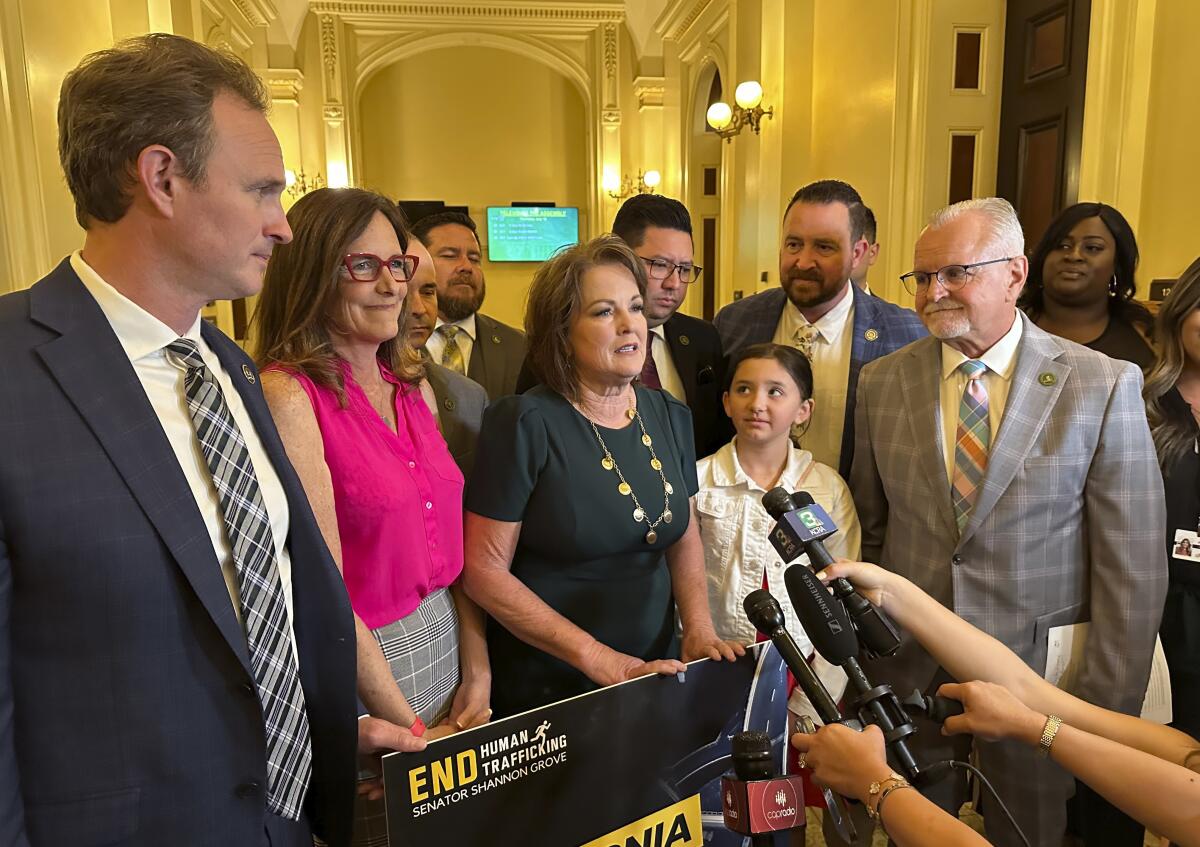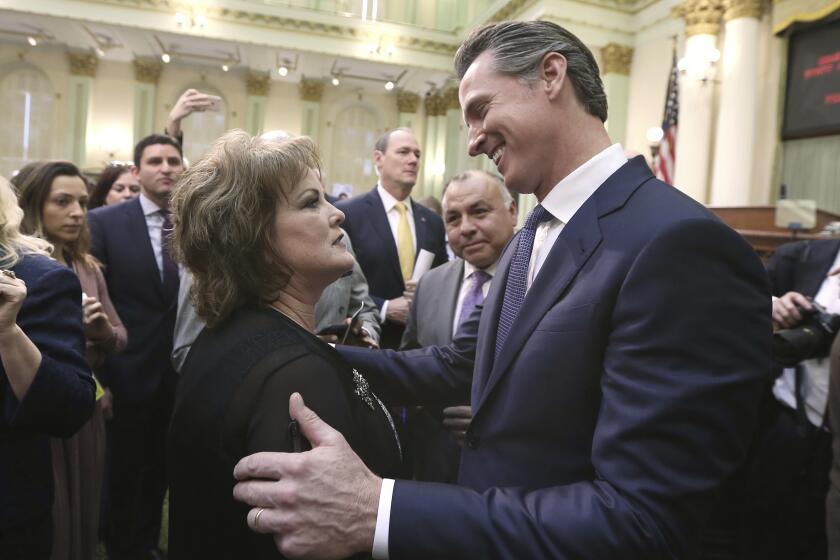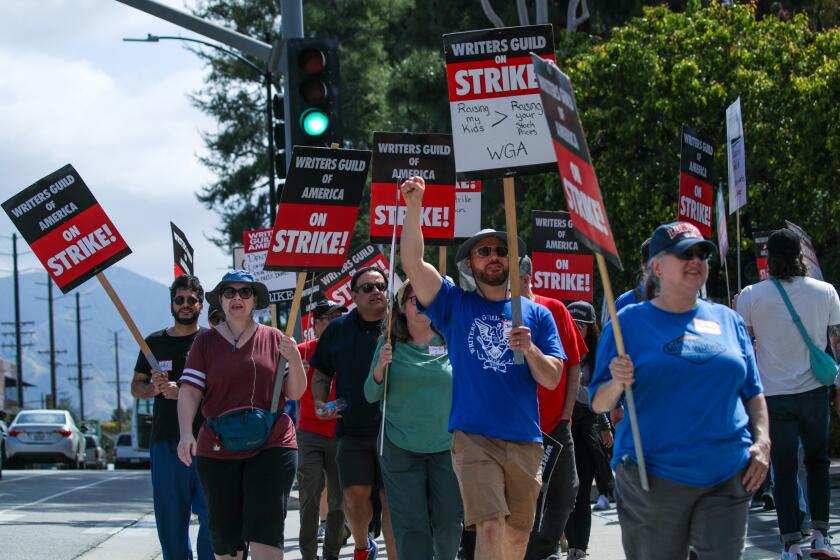A rare win for Republicans, triumph for labor and dilemma for Newsom

- Share via
SACRAMENTO — The lopsidedly Democratic California Legislature was turned on its head. The most dramatic event of this year’s just-concluded session was a bizarre, unanimous Republican victory.
The rare GOP triumph was led by a tenacious Bakersfield conservative, Sen. Shannon Grove, whose cause was right. In the end, it proved irresistible even for liberal lawmakers whose ideology was antithetical to her bill.
Grove’s cause was longer prison sentences for sex traffickers of children. Her bill, SB 14, classified the pimping of kids under 18 as a “serious” crime. Duh! What’s to argue?
Nothing, the Senate figured. It voted 40-0 without debate just before the Memorial Day weekend to send her bill to the Assembly.
But categorizing sex trafficking of children as a serious felony subjects repeat offenders to California’s “three-strikes” law that liberals have been on a crusade to scuttle because it can mean life sentences and overcrowded prisons.
So in July, Grove’s bill was shelved by the Assembly Public Safety Committee chaired by Assemblymember Reginald Jones-Sawyer (D-Los Angeles). This panel has long been a deathbed for sentence-stiffening bills.
“The media got hold of it,” Grove told me. “Californians wouldn’t have known about it if you guys weren’t engaged. Then the governor definitely got engaged. And the speaker engaged.”
California lawmakers sent Gov. Gavin Newsom a controversial bill Wednesday to increase penalties for child sex traffickers.
There was public outrage — and intervention by the two powerful Democrats: Gov. Gavin Newsom and new Assembly Speaker Robert Rivas (D-Hollister). Their arm-twisting saved the bill. The Assembly Public Safety Committee briefly reconvened and Democrats meekly resurrected the measure.
SB 14 finally reached the Assembly floor Sept. 11 and passed 80-0, but only after Republicans rubbed the Democrats’ noses in it.
“People commit crimes and nothing happens,” Republican Leader James Gallagher of Yuba City asserted, echoing a much-repeated GOP line that may be gaining more public traction. “Finally we’re taking a stand today.”
Republican Assemblyman Bill Essayli of Corona contended that stiffer sentences for sex traffickers went against the liberals’ “empty-the-prisons agenda.”
Democratic Assemblyman Al Muratsuchi of Rolling Hills Estates, a former prosecutor, cautioned party colleagues: “We need to restore balance — continue to invest in programs like mental health and education, but do more to keep our neighborhoods safe … making sure those committing the most heinous crimes are locked up where they’re not hurting more people.”
The Senate later agreed to Assembly amendments that protected trafficked victims from being targeted by prosecutors, a stated liberal fear. And the measure was sent to Newsom on a unanimous vote.
It was a major triumph not only for Grove and Republicans, but for two Democrats: the rookie speaker and the nationally ambitious governor.
Newsom’s biggest victory, however, was bipartisan passage just before legislative adjournment Thursday night of the governor’s sorely needed overhaul of mental health laws and funding. It represented his latest attempt — mostly failed — to solve California’s persistent problem of homelessness.
The Legislature passed three bills, two whose author was Sen. Susan Talamantes Eggman (D-Stockton), who grew up watching her aunt Barbara suffer from mental illness. Her aunt never received adequate treatment and struggled on and off the street, then was gang-raped and soon died of AIDs.
Much of today’s homeless dilemma stems from Gov. Ronald Reagan and the Legislature closing state mental health hospitals 56 years ago. Sacramento turned over patients’ care to counties. But little money was supplied for treatment. Many former patients self-medicated with drugs and alcohol and wound up on the street.
One Eggman bill, SB 43, would make it easier for homeless people with severe substance abuse and mental disorders to be detained against their will for treatment.
The other Eggman bill, SB 326, would redirect $1 billion annually from the so-called millionaires’ tax — roughly 30% of the fund — to operate new mental health housing and treatment facilities for 10,000 additional people with serious behavioral health or substance-abuse problems.
Voters in the March presidential primary will need to approve the reconfiguration of millionaires’ tax spending. And they’ll also be asked to authorize a $6.4-billion bond issue to build the new housing and treatment units.
That Newsom bond proposal — jockeyed through the Legislature by Assemblywoman Jacqui Irwin (D-Thousand Oaks) — expanded quietly and unexpectedly by $1.7 billion in the final three harried days of the legislative session. A little bait and switch? What’s another billion or two?
The recent run of wins in the Legislature for organized labor was remarkable. Now Gov. Newsom must decide if union-backed bills will become law.
But the session’s grand winner was labor, the state Capitol’s most powerful special interest these days.
It achieved legislation to increase the number of employees’ paid sick days, raise the minimum wage for healthcare and fast-food workers and even permit legislative staffers to unionize.
The biggest eye-opener, however, was legislation to allow striking workers to collect state unemployment insurance after two weeks.
“When someone goes on strike, it’s not a romantic thing. It’s hard on that family,” declared Sen. Anthony Portantino (D-Burbank) during heated debate on his bill, SB 799.
“This is the craziest thing I’ve seen,” countered Sen. Brian Dahle (R-Bieber), who runs a seed farming business. “Someone who has a job? Goes on strike and gets [state] benefits?”
Dahle made sense and so did Sen. Kelly Seyarto (R-Murrieta), who argued: “Going on strike is a voluntary thing. And that’s not what unemployment insurance is set up for.”
Both houses sent the bill to the governor on a party-line vote.
Newsom expressed concerns about the measure last week — torn between his loyalty to labor and realization that the state’s unemployment insurance fund is already roughly $20 billion in debt.
“One has to be cautious,” the governor said noncommittally when asked whether he’d sign the bill.
Cautious fiscally and politically.
By contrast, the only need for caution regarding the child sex-trafficking bill is to make sure the unconscionable bad guys are locked up for a very long time.
More to Read
Sign up for Essential California
The most important California stories and recommendations in your inbox every morning.
You may occasionally receive promotional content from the Los Angeles Times.
















